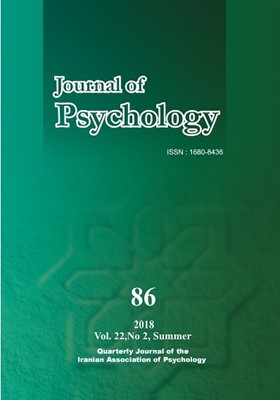The Effectiveness of Group Counseling "Narrative Therapy" on Family Functioning among Women with Addicted Husbands
Subject Areas : روانشناسیMohammad Khodayarifard 1 , Gholamreza Sohrabpour 2 , Elahe Hejazi 3
1 - University of Tehran
2 - Faculty of Psychology and Education, University of Tehran, I.R.Iran
3 - University of Tehran
Keywords: woman, addiction family, group counseling, narrative therapy,
Abstract :
The purpose of the current study was to investigate the effectiveness of group counseling "Narrative therapy" on family functioning among women with addicted husbands. Present research was an experimental study with pretest-posttest control group design along with follow up 1 month and 3 month. Participants were 44 persons of the 10 region of Tehran who had family functioning score lower than the mean of statistical population. They were selected based on the voluntary sampling procedure, and were also randomly assigned to two groups, experimental and control. After the early loss, each group was include 20 persons and is evaluated by Family Assessment Device (FAD) after doing interview in the same condition. The experimental group received 10 sessions of group counseling "Narrative therapy" and the control group did not received any intervention. Both groups were evaluated again at the end of intervention, 1 month and also 3 month after that. Data analyzed with repeated measure analysis of variance and Bonferroni post-hoc test. Family functioning the (problem solving, communication, roles, affective responsiveness, affective involvement, behavior control and general functioning) of women who received the sessions of group counseling "Narrative therapy" was improved significantly rather than they who did not received that.
ارمی، حسن؛ اژه ای، جواد؛ محمدخانی، شهرام و بادله، مرتضی (1395). «مقایسۀ روان بنه های هیجانی میان افراد معتاد و غیر معتاد»، مجلۀ روانشناسی، 20، 3، 291-281.
امیری، سهراب؛ نواب، امیر قاسمی و عبداللهی، محمدحسین (1396). «بررسی مقایسه ای نظام های مغزی/ رفتاری و کارکردهای اجرایی در افراد سیگاری، سوءمصرف کنندگان مواد و افراد عادی»، مجلۀ روانشناسی، 21، 1، 84-67.
ایلایی، احترام السادات (1376). «بررسی نسبت سازگاری والدین کودکان عقبماندۀ ذهنی در رابطه با عوامل تنشزا در مدارس استثنایی شهر ساری»، پایاننامۀ کارشناسی ارشد، رشتۀ روانشناسی بالینی، دانشگاه تهران.
آزادارمکی، تقی (1390). جامعهشناسی خانواده ایرانی، تهران: سمت.
ثنایی ذاکر، باقر (7831). مقیاس های سنجش خانواده و ازدواج، تهران: بعثت، 2.
حسنی، محدثه (1388). «بررسی همهگیرشناسی نگرانی از بدریختی بدن و اثربخشی روایت درمانی به شیوۀ گروهی بر کاهش آن در دانشجویان دانشگاه شهید چمران اهواز»، پایاننامۀ کارشناسی ارشد، دانشگاه شهید چمران اهواز.
خسروی، زهره؛ كيامنش، علیرضا؛ بنی جمالی، شکوه السادات و نیک منش، زهرا (1386). «بررسی كيفی نقش عملكرد خانواده در بروز رفتارهای مخاطره آميز نوجوانان»، مطالعات روانشناختی دانشگاه الزهرا، 3، 4، 67-46.
ربیعی، سولماز؛ فاتحی زاده، مریم و بهرامی، فاطمه (1387). «بررسی تأثیر روایت درمانی زوجی بر عملکرد خانوادگی زوجین شهر اصفهان»، فصلنامۀ خانواده پژوهی، 4، 14.
رحیمی نژاد، عباس و پاکنژاد، محسن (1393). «رابطۀ عملکرد خانواده و نیازهای روانشناختی با سلامت روانی نوجوانان»، فصلنامۀ خانواده پژوهی، 10، 37.
زرگر، فاطمه؛ عاشوری، احمد؛ اصغری پور، نگار و عاقبتی، اسماء (1386). «مقایسۀ عملکرد خانواده بیماران مبتلا به اختلال افسردگی عمده با بیماران بدون اختلالات روانپزشکی در شهر اصفهان»، مجلۀ تحقیقات علوم رفتاری، 5، 2، 106-99.
غلامی، علیرضا (1387). روایت درمانی، مشاور مدرسه، 4، 1.
کوری، جرالد (1391). نظریهها و کاربست مشاوره و رواندرمانی، ترجمۀ یحیی سیدمحمدی، تهران: ارسباران.
محمدی فر، محمدعلی؛ طالبی، ابوالفضل و طباطبایی، سید موسی (1389). «تأثیر آموزش مهارت های زندگی بر عملکرد خانواده در زنان دارای همسر معتاد»، فصلنامۀ اعتیاد پژوهی سوءمصرف مواد، 4، 16، 39-25.
نظری، شیما (4831). «بررسی نظر والدین کودکان مصروع نسبت به عوامل تنشزا و میزان سازگاری آنان با این عوامل در مراجعهکنندگان به مراکز درمانی منتخب شهر تهران»، پایاننامۀ کارشناسی ارشد، رشتۀ پرستاری، دانشگاه تهران.
Brimhall, A. S., Gardner, B. C., & Henline, B. H. (2003). Enhancing narrative couple therapy process with an enactment Scaffolding. Journal of Contemporary Family Therapy, 25(4): 391-411.
Carr, A. (2012). Family therapy: Concepts, process, and practice. Malden: John Wily & Sons.
Carlson, J., Sperry, L., & Lewis, J. A. (2005). Family therapy techniques. New York: Routledge.
Cloitre, M., Henn-Haase, C., Herman, J. L., Jackson, C., Kaslow, N., Klein, C., Mendelsohn, M., & Petkova, E. (2014). A multi-site single-blind clinical study to compare the effects of STAIR Narrative Therapy to treatment as usual among women with PTSD in public sector mental health settings: study protocol for a randomized controlled trial. Trials, 15, 197. Doi: 10.1186/1745-6215-15-197.
Dryden, W. (2007). Dryden's handbook of individual therapy. London: Sage publication, 412.
Epshtein, M. D., Gillberg, & Christopher, M. D. (2001). The family background in Nervosa. A Publication Study.
Epstein, N. B., Bishop, D. S., & Levin, S. (1978). The McMaster Model of Family functioning. Journal of Marital and Family Therapy. 4(4):19-31.
Frost, D. M. (2012). The narrative construction of intimacy and affect in relationship stories: Implications for relationship quality, stability, and mental health. Journal of social and personal relationships, 30(3): 247-269.
Josselson, R., Lieblich, A., & McAdams, D. P. (2007). The meaning of others: Narrative studies of relationships. Washington, DC: American psychological Association.
Kristy, L., Thomas W., Kathryn A., & Josef, L. (2013). The social construction of love through intergenerational processes. Contemporary Family Therapy, 35:773 – 792.
Lambert, J. (2013). Digital storytelling: Capturing lives, creating community. Routledge.
Payne, M. (2006). Narrative therapy: An introduction for counsellors. London: Sage publication.
Ricks, L., Kitchens, S., Goodrich, T., & Hancock, E. (2014). My story: The use of narrative therapy in individual and group counseling. Journal of Creativity in Mental Health, 9: 99-110.
Silburn, S., Zubrick S., De Maio, J., Shepherd, C., Griffin, J., & Mitrou, F. (2006). The western Australian Aboriginal Child Health Survey: Strengthening the capacity of Aboriginal Children, families and communities. Perth: Curtin University of Technology and Telethon Institute for Child Health Research.
Volkow, N. D., Koob, G. F., & McLellan, A. T. (2016). Neurobiologic advances from the brain disease model of addiction. New England Journal of Medicine, 374: 363-371.
Walsh, F. (2003). Family resilience: A framework for clinical practice. Journal Family Process, 42 (1), 1-19.
White, M., & Epston, D. (1990). Narrative means to therapeutic ends. New York: W. W. Norton.


